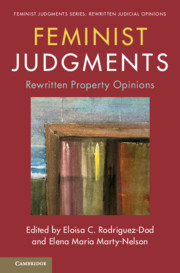Book contents
- Feminist Judgments: Rewritten Property Opinions
- Feminist Judgments Series
- Advisory Panel for Feminist Judgments Series
- Feminist Judgments: Rewritten Property Opinions
- Copyright page
- Dedication
- Contents
- Advisory Panel for Feminist Judgments: Rewritten Property Opinions
- Notes on Contributors
- Preface
- Acknowledgments
- About the Cover Art
- Part I Introduction
- Part II Allocation of Rights
- Part III Patents, Publicity Rights, and Trademarks
- Part IV Condemnation and Adverse Possession
- Part V Gifts and Future Interests
- Part VI Tenancy in Common, Joint Tenancy, and Tenancy by the Entirety
- Part VII Exclusionary Zoning
- Part VIII Evictions
- 16 Commentary on Phillips Neighborhood Housing Trust v. Brown
- 17 Commentary on Blake v. Stradford
- Part IX Landlord–Tenant Premises Liability
- Index
16 - Commentary on Phillips Neighborhood Housing Trust v. Brown
from Part VIII - Evictions
Published online by Cambridge University Press: 21 October 2021
- Feminist Judgments: Rewritten Property Opinions
- Feminist Judgments Series
- Advisory Panel for Feminist Judgments Series
- Feminist Judgments: Rewritten Property Opinions
- Copyright page
- Dedication
- Contents
- Advisory Panel for Feminist Judgments: Rewritten Property Opinions
- Notes on Contributors
- Preface
- Acknowledgments
- About the Cover Art
- Part I Introduction
- Part II Allocation of Rights
- Part III Patents, Publicity Rights, and Trademarks
- Part IV Condemnation and Adverse Possession
- Part V Gifts and Future Interests
- Part VI Tenancy in Common, Joint Tenancy, and Tenancy by the Entirety
- Part VII Exclusionary Zoning
- Part VIII Evictions
- 16 Commentary on Phillips Neighborhood Housing Trust v. Brown
- 17 Commentary on Blake v. Stradford
- Part IX Landlord–Tenant Premises Liability
- Index
Summary
The 1960s began a sustained transformation of American residential landlord–tenant law that was long heralded as a “revolution.”1 Through it, the status of residential tenants was (purportedly) improved substantially; and, it remains widely accepted, the law “escaped from the realm of private ordering, in which the stronger party typically has the advantage, and has become subject to regulation in the public interest.”2 Due to the radical realignments of this period, almost all tenants now enjoy the legal right to residences fit for human habitation as a “just and necessary implication” of their leases.3 Arguably more important, the “extraordinary ferment”4 markedly curtailed landlords’ power to control unilaterally the terms, conditions, and performance under leases by, among other changes, expanding procedural protections against retaliatory, arbitrary, capricious, constructive, profiteering, or otherwise exploitative eviction.
- Type
- Chapter
- Information
- Feminist Judgments: Rewritten Property Opinions , pp. 345 - 370Publisher: Cambridge University PressPrint publication year: 2021

